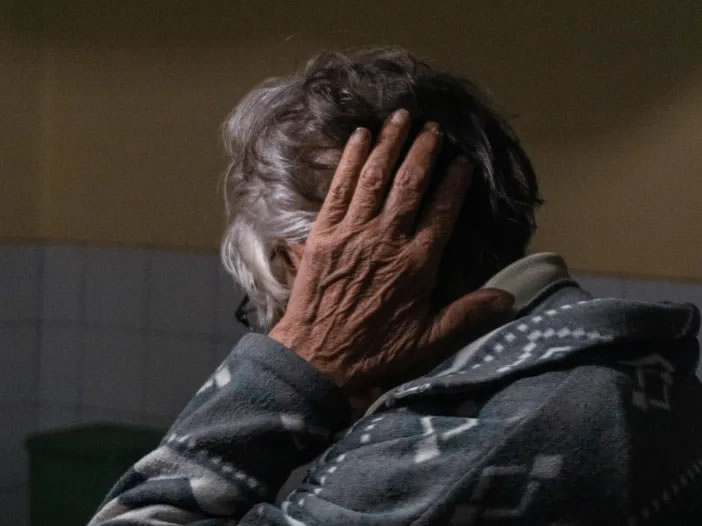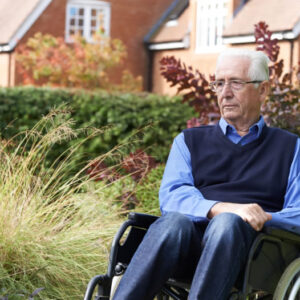Placing a loved one in a nursing home is a difficult decision, made with the expectation that they’ll receive compassionate care in a safe environment. Unfortunately, nursing home abuse is a growing concern across the country—including in Illinois.
Studies suggest that 1 in 6 older adults experience some form of abuse in a community setting, yet many cases go unreported. If you have a loved one in a facility in Chicago, Aurora, Naperville, or other areas of Illinois, you need to stay vigilant. Understanding the warning signs of elder abuse can help you take action before the situation worsens.
What Is Nursing Home Abuse?
Nursing home abuse refers to any form of harm or neglect inflicted upon an elderly resident by caregivers, staff, or other residents. It can take many forms, including physical, emotional, and financial, as well as neglect. Elder mistreatment isn’t always obvious, which is why families must familiarize themselves with these common forms of elder abuse:
- Physical Abuse. Hitting, pushing, restraining, or intentionally inflicting harm.
- Emotional & Psychological Abuse. Verbal threats, intimidation, or humiliation.
- Neglect. Failure to provide basic needs such as food, hygiene, and medical care.
- Financial Exploitation. Unauthorized use of an elderly person’s money or property.
1. Physical Signs of Nursing Home Abuse
Many cases of nursing home abuse involve physical mistreatment or neglect, which can lead to serious injuries or declining health. Because seniors are often frail, even minor incidents can result in long-term complications. If you visit a nursing home and notice these physical indicators, your loved one may be experiencing abuse or neglect:
- Frequent injuries with vague or conflicting explanations can be a red flag.
- Pressure ulcers that develop when immobile patients aren’t repositioned regularly.
- Dirty clothes, unkempt hair, and strong odors may indicate a lack of proper care.
- Malnutrition and dehydration are common in neglected nursing home residents.
- Recurring infections can suggest a lack of medical attention or poor facility sanitation.
Physical symptoms of neglect or abuse should never be ignored. If you see any of these warning signs, request an immediate explanation from facility staff. If their answers are vague, dismissive, or inconsistent, it may be time to take further action.
2. Emotional & Psychological Signs of Abuse
Not all forms of nursing home abuse leave visible marks. Emotional and psychological abuse can be just as damaging, leading to depression, anxiety, and severe distress in elderly residents. Unfortunately, this form of mistreatment often goes unnoticed because the signs are subtle. If your loved one begins to display unusual emotional responses, it may indicate they are experiencing verbal abuse, manipulation, or intimidation from caregivers or other residents:
- A previously social resident becoming unusually quiet or disinterested in activities.
- A resident showing signs of anxiety or appearing on edge when caregivers are present.
- Frequent episodes of anger, sadness, or crying without clear reasoning.
- Residents may avoid answering questions about their well-being out of fear of retaliation.
- A drastic change in engagement with loved ones or activities they once enjoyed.
Many nursing home residents rely on caregivers for daily assistance, which can make them feel trapped or powerless to report mistreatment. Families must pay close attention to subtle behavioral changes, especially if a loved one seems unusually fearful or withdrawn.
3. Neglect: A Silent Form of Abuse
Neglect is one of the most common yet underreported forms of nursing home abuse. Unlike physical or emotional abuse, neglect isn’t always intentional—it can result from understaffing, poor training, or general carelessness. However, regardless of the reason, failing to meet a resident’s basic needs can have devastating consequences. Common signs of neglect include:
- Residents left unbathed or with untrimmed nails, dirty clothing, or unbrushed teeth.
- Dirty rooms, soiled bedding, or unpleasant odors in the facility.
- Missed medications, skipped doses or incorrect prescriptions that put residents at risk.
- Unattended medical needs or worsening chronic conditions due to lack of treatment.
- Dehydration and malnutrition, unexplained weight loss, dry skin, or excessive thirst.
Many nursing homes struggle with understaffing, especially in larger metropolitan areas like Chicago and the surrounding suburbs. When staff members are overworked, residents may not receive adequate care, leading to poor hygiene, skipped meals, or missed medical treatments. Illinois families should pay close attention to facility conditions and staffing levels during visits to ensure their loved one’s needs are being met.
4. Financial Exploitation of Elderly Residents
Elderly residents in nursing homes are vulnerable to financial abuse, often at the hands of caregivers, facility staff, or even other residents. Since many seniors trust others to manage their finances, it can be difficult to detect when money or assets are being misused. Some of the red flags of financial abuse or exploitation include:
- Large or frequent bank transactions without the resident’s knowledge.
- Unexpected modifications to wills, powers of attorney, or beneficiary designations.
- Strange charges on bank statements for services or products the resident never requested.
- A previously stable resident suddenly struggling to pay for care or basic needs.
- Employees influencing financial decisions or requesting personal gifts or favors.
While nursing home staff members are the most common offenders, family members, friends, and even financial advisors can also take advantage of elderly residents. This is particularly concerning for seniors with cognitive impairments like dementia, who may not realize they are being deceived.
Why Nursing Home Abuse Goes Undetected
Many elderly residents fear retaliation if they speak out about neglect or mistreatment. Others, particularly those with dementia or communication challenges, may be unable to report their experiences. As a result, it’s often up to family members to spot the warning signs and advocate for their loved one’s well-being.
Steps to Take If You Suspect Nursing Home Abuse
If you believe your loved one is experiencing abuse or neglect at a nursing home in Chicago, Aurora, Naperville, it’s essential to act quickly. Nursing home residents are often vulnerable and unable to advocate for themselves, so family members must take the lead in investigating concerns. The following steps will help you assess the situation and take the appropriate action.
1. Document the Evidence
The first step in addressing suspected nursing home abuse is to gather as much evidence as possible. Start by keeping a detailed log of dates, times, and observations of any concerning incidents. If your loved one has visible injuries, such as bruises or bedsores, take clear photographs from multiple angles. Document changes in their physical or emotional condition, noting signs of fear, sudden weight loss, or unusual behaviors.
If possible, request copies of their medical records to look for inconsistencies in care. If you notice unsanitary living conditions or lack of medical attention, write down specific examples and ask staff for explanations. The more evidence you collect, the stronger your case will be if legal action becomes necessary.
2. Speak to Your Loved One
If your loved one is able to communicate, ask them directly about their care—but do so in a way that makes them feel safe. Instead of yes-or-no questions, use open-ended prompts like, “How do you feel about the care you’re receiving?” or “Have you ever felt afraid of a caregiver?”
Keep in mind that residents may feel scared to speak up due to fear of retaliation. If they hesitate or seem nervous, reassure them that you are there to help and that they won’t get in trouble for telling the truth. If they are reluctant to talk in front of staff, try to have these conversations in private.
3. Talk to the Nursing Home Staff & Management
Once you’ve documented concerns and spoken with your loved one, address the issue with nursing home staff and administrators. Start by calmly asking for explanations about any injuries, hygiene issues, or behavioral changes you’ve noticed. If their responses seem vague, dismissive, or inconsistent, ask for a written report of their explanation and request to see relevant documentation, such as incident reports or medical records.
If the facility seems unwilling to cooperate, it could indicate that they’re trying to cover up neglect or mistreatment. Be persistent in requesting answers and take note of any staff members who appear defensive or avoidant.
4. Report the Abuse
If you aren’t satisfied with the facility’s response—or if you suspect serious abuse or neglect—it’s time to escalate the issue by filing an official complaint. In Illinois, you can report nursing home abuse to the Illinois Department of Public Health (IDPH), which is responsible for investigating complaints against long-term care facilities. You can also contact Adult Protective Services (APS) if your loved one lives in a private residential setting.
Additionally, each nursing home has a long-term care ombudsman, an advocate who helps resolve issues between residents and facilities. These agencies have the authority to investigate claims and take corrective action if abuse is confirmed. Reporting abuse is not only essential for your loved one’s safety but also helps protect other residents from similar mistreatment.
5. Seek Legal Help
If the nursing home fails to take corrective action, or if the abuse has already resulted in serious injury or emotional trauma, it may be time to consult an experienced nursing home abuse lawyer. A legal professional can help you navigate the complaint process, gather further evidence, and file a lawsuit against the responsible parties.
Many families are unaware of their legal rights when it comes to elder abuse claims, and an attorney can help ensure that your loved one receives the justice and compensation they deserve. A successful case can result in financial damages for medical bills, pain and suffering, and even punitive damages if the facility engaged in extreme negligence.
How a Nursing Home Abuse Lawyer Can Help
Many families feel overwhelmed when dealing with nursing home abuse claims, especially when trying to gather evidence and navigate legal procedures. An experienced nursing home abuse attorney in Illinois can handle the legal process while ensuring your loved one gets the protection and compensation they deserve.
1. Investigating the Case
One of the first steps a nursing home abuse lawyer will take is to conduct a thorough investigation into the alleged mistreatment. This includes reviewing medical records, speaking with witnesses, and obtaining facility reports that may reveal patterns of negligence. A lawyer’s investigative resources often uncover hidden abuse that families might not notice on their own.
2. Filing a Lawsuit
If evidence confirms that abuse or neglect has occurred, a lawyer can help you file a lawsuit against the responsible parties. This may include the nursing home facility, specific staff members, or even third-party contractors who contributed to the mistreatment. Legal action can hold negligent facilities accountable and force them to change their policies, helping to prevent similar incidents in the future.
3. Securing Compensation
Nursing home abuse can result in physical injuries, emotional trauma, and financial hardship. A lawyer can help families seek compensation for medical expenses, pain and suffering, and relocation costs if moving to a new facility becomes necessary. In severe cases, courts may award punitive damages to punish the nursing home for extreme negligence or intentional harm. Seeking compensation ensures that your loved one receives the care and support they need to recover.
4. Negotiating a Settlement
Many nursing homes prefer to settle abuse cases out of court rather than risk negative publicity. A lawyer can handle negotiations on your behalf, ensuring that any settlement offer fully covers your loved one’s damages. Without legal representation, families may unknowingly accept lowball offers that do not account for the full extent of harm suffered. An attorney will fight for a fair settlement that reflects the true cost of the abuse or neglect.
5. Providing Peace of Mind
Perhaps most importantly, hiring a lawyer allows families to focus on their loved one’s well-being instead of battling a complex legal system. Experienced attorneys understand the laws governing nursing home abuse in Illinois and can guide you through every step of the process. Knowing that a legal expert is handling the case provides families with peace of mind and ensures that justice is pursued without unnecessary stress.
Common FAQs About Nursing Home Abuse
Families with loved ones in long-term care facilities often have many questions about nursing home abuse—how to recognize it, what to do, and how to protect vulnerable residents. Below are answers to some of the most frequently asked questions.
Q: How common is nursing home abuse?
Nursing home abuse is more widespread than many people realize. Studies estimate that 1 in 6 older adults in institutional settings experience some form of abuse, though many cases go unreported due to fear or lack of awareness. Understaffing and poor facility oversight often contribute to neglect and mistreatment.
Q: What are the first signs of nursing home neglect?
The earliest signs of neglect can include poor hygiene, weight loss, bedsores, dehydration, and a lack of clean clothing or bedding. If a resident appears withdrawn, fearful, or reluctant to speak, they may also be experiencing emotional or psychological abuse.
Q: Who is most at risk for nursing home abuse?
Seniors who are physically or mentally impaired—especially those with dementia or limited mobility—are at a higher risk of being abused or neglected. Residents without frequent visitors may also be more vulnerable since they have fewer opportunities to report mistreatment.
Q: Can I sue a nursing home for abuse or neglect?
Yes, if a nursing home fails to provide proper care and your loved one suffers injury, emotional trauma, or financial exploitation, you may be able to file a lawsuit against the facility. A nursing home abuse lawyer in Illinois can help you understand whether you have a case.
Q: What should I do if a nursing home denies my complaint?
If a facility dismisses or denies concerns about neglect or abuse, you should document everything and escalate the issue. You can report the nursing home to state agencies, such as the Illinois Department of Public Health (IDPH) or a nursing home ombudsman. If the situation persists, consulting a nursing home abuse attorney can help you take legal action.
Q: How can I prevent nursing home abuse?
The best way to protect a loved one is to visit frequently and unannounced to observe their condition. Build a relationship with staff, ask about care routines, and monitor any changes in your loved one’s physical or emotional health. If possible, involve multiple family members in regular check-ins.
Q: How long do I have to file a nursing home abuse claim?
In Illinois, the statute of limitations for filing a nursing home abuse lawsuit in Illinois is generally two years from the date of the incident or discovery of harm. However, exceptions may apply, so speaking with a lawyer as soon as possible ensures you don’t miss important deadlines.
Q: What compensation can my loved one receive in an abuse case?
Compensation in a nursing home abuse case may include coverage for medical expenses, pain and suffering, emotional distress, and punitive damages if the facility acted with extreme negligence. Each case is unique, so the amount varies based on the severity of the harm.
Q: Who can I contact for help with nursing home abuse?
If you suspect nursing home abuse in Illinois, you can file a complaint with the Illinois Department of Public Health, call Adult Protective Services, or reach out to a nursing home abuse attorney to discuss your legal options. A skilled lawyer can help protect your loved one’s rights and seek justice for any harm suffered.
Protecting Your Loved One Starts with Awareness and Action
Nursing home abuse is a serious issue that can have devastating effects on elderly residents and their families. Recognizing the warning signs—whether physical, emotional, or financial—is crucial in protecting your loved one’s well-being.
If you suspect neglect or mistreatment, take action immediately by documenting evidence, speaking with facility staff, and reporting concerns to the proper authorities. When necessary, legal action can hold negligent nursing homes accountable and help secure justice for victims.
If your loved one has suffered abuse in a nursing home, Cullotta Bravo Law Group is here to help—contact us today for a free consultation.
Filed Under: Nursing Home Abuse


















